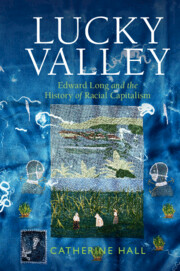Book contents
- Reviews
- Lucky Valley
- Critical Perspectives on Empire
- Lucky Valley
- Copyright page
- Dedication
- Contents
- Colour Plates
- Figures
- Maps
- Acknowledgements
- A Note on Language
- Prologue
- Maps and Family Tree
- Introduction
- Part I Growing up English
- Part II The Lineaments of Racial Capitalism
- Part III Making a Slave Society
- Epilogue
- Bibliography
- Index
- Plate Section (PDF Only)
Introduction
Published online by Cambridge University Press: 11 January 2024
- Reviews
- Lucky Valley
- Critical Perspectives on Empire
- Lucky Valley
- Copyright page
- Dedication
- Contents
- Colour Plates
- Figures
- Maps
- Acknowledgements
- A Note on Language
- Prologue
- Maps and Family Tree
- Introduction
- Part I Growing up English
- Part II The Lineaments of Racial Capitalism
- Part III Making a Slave Society
- Epilogue
- Bibliography
- Index
- Plate Section (PDF Only)
Summary
Edward Long’s History of Jamaica was published in 1774 and has been in print ever since. It was a text designed to legitimate slavery as central to Britain’s wealth and power and to encourage new white settlers to come to the island. A judgment by Lord Mansfield had persuaded the slave-owners that they could no longer rely on the law to protect their ‘property’ in enslaved men and women. New legitimations were necessary and Long’s encyclopaedic History, encompassing population, politics, the economy, law, and the topography and natural history of the island, was structured around a defence of slavery and natural difference. Long’s History continues to be read by numerous scholars interested in racial difference and in eighteenth-century Britain and its relation to the Caribbean. But it has never been fully contextualized either in his family history or in his place in the Enlightenment. An Enlightenment man, Long was determined to represent plantation slavery as a civilizing process for barbarous Africans. Nor has the History been thought about in terms of its relevance to the present. Key concepts utilized in the analysis of his work are introduced, including racial capitalism, racialization, reproduction and disavowal.
Keywords
- Type
- Chapter
- Information
- Lucky ValleyEdward Long and the History of Racial Capitalism, pp. 1 - 38Publisher: Cambridge University PressPrint publication year: 2024



